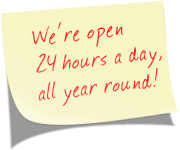Site Menu






Apostrophes – An Introduction |
If you are a writer, it can be helpful to understand the basics of different punctuation marks. Through this article, you are provided an overview to the apostrophe. Once you have had occasion to review this article, you will know more about the fundamentals, history and proper usage of the apostrophe.
As mentioned a moment ago, the apostrophe is a punctuation mark. In that regard, the apostrophe has two primary uses:
A. the apostrophe is used to mark omissions (particularly in conjunctions)
B. the apostrophe is also utilized to make nouns and pronouns possessive
In the English language, the use of the apostrophe to indicate possession is derived from what is known as the Old English genitive case. Historically, possession was denoted by adding the letters “es” to the end of a noun or a pronoun. In time, that evolved into the use of a simple “s.” The use of the “s” alone occurred during the seventeenth century.
No long after the introduction of the “s” alone, the apostrophe ('s) came into usage. As mentioned at the outset of this article, one of the uses of the apostrophe was to replace an omitted letter as well as for possessive purposes. The reality is that historically the apostrophe came into being on some level to replace the letter “e” which historically had been utilized to demonstrate possession in regard to nouns and pronouns.
The most basic and fundamental rule pertaining to the proper use of an apostrophe involves making a singular noun possessive. This includes both formal and informal nouns. For example:
“The puppy's tail wagged happily.”
or
“Mary's hat was left in the church pew.”
Some confusion starts to occur when an effort is made to turn a plural noun possessive. Indeed, it is precisely in such circumstances that even experienced writers tend to make mistakes. The general rule is that when a noun is considered to be a “normal plural” (a noun with an “s” already placed at the end of the word to make it plural) no additional “s” is to be added to render the plural noun possessive.
The correct way in which to turn a normal plural noun possessive is:
“The kittens' mother watched her babies with care.”
Oftentimes, a writer actually will incorrectly attempt to make a normal plural noun possessive in this manner:
“The kittens's mother watched her babies with care.”
“The women's book club meets on Thursday afternoons at the pub.”
Very few people actually do make a mistake of not including an “s” in their efforts to make these types of words possessive. However, a mistake that occurs in some instances when making this type of word possessive occurs in regard to the placement of the apostrophe itself. For example:
“The womens' book club meets on Thursday afternoons at the pub.”
There are some rather important variations on the principles that have been shared with you thus far. A prime example involves words like “people.” Obviously, people denotes many persons and seems to be a plural word on the surface. However, the reality is that “people” really is a singular word. Therefore, if you want to make it possessive, the proper manner to write would be:
“The people's education was scant.”
On the other hand, “peoples” is the plural derivation of the word “people” and is used from time to time in writing, oftentimes in more formal texts. The proper way to make “peoples” possessive is as follows:
“The peoples' cars were parked askew in the lot.”
Compound nouns require particular consideration when it comes to using an apostrophe. Consider for a moment the compound noun “attorney general.” “Attorney general” is the singular derivation of the word. The plural form is not, as some assume, attorney generals. Rather, the proper plural form is attorneys general. The same holds true for words like “chaise lounge.” “Chaise lounge” is the singular form while “chaises lounge” is the plural.
The possessive singular form of these words are:
“attorney general's” and “chaise lounge's”
For example: “The attorney general's opinion was direct” or “The chaise lounge's cover was violet.”
The plural possessive form of these words is particularly interesting:
Attorneys general's and chaises lounge's
For example: “The attorneys general's wives met for tea” or “All of the chaises lounge's covers were torn.”
As mentioned previously, apostrophes are also used to mark omitted letters, particularly in conjunctive words. For example, when the words “do” and “not” are combined to form “don't”, the apostrophe takes the place of the second “o” in the conjunctive word.
In this day and age, many slang words are created through the omission of a letter from the standard and appropriate spelling of a word. By way of example, in fictional writing, this type of practice is common in dialogue. By way of illustrative example:
“I am not goin' to the movie.”
Of course, with the exception of crafting “believable” dialogue, the use of an apostrophe in an improper or incorrect word form ... is not proper. Merely inserting an apostrophe into or at the end of an improper or incorrect word does not suddenly render it appropriate and correct.
Apostrophes that are used incorrectly to form plural words are known as “greengrocers' apostrophes.” This problem and incorrect usage actually appears to stem from the identical sound of the possessive and the plural form of most nouns used in the English language.
As an interesting aside, it is believed that the term greengrocers' apostrophes was coined in the mid-twentieth century by a teacher in Liverpool, England. The incorrect use of the apostrophe to make words plural apparently was common on the advertisement signs of greengrocers in the United Kingdom and elsewhere:
“Orange's on sale – cheap!”